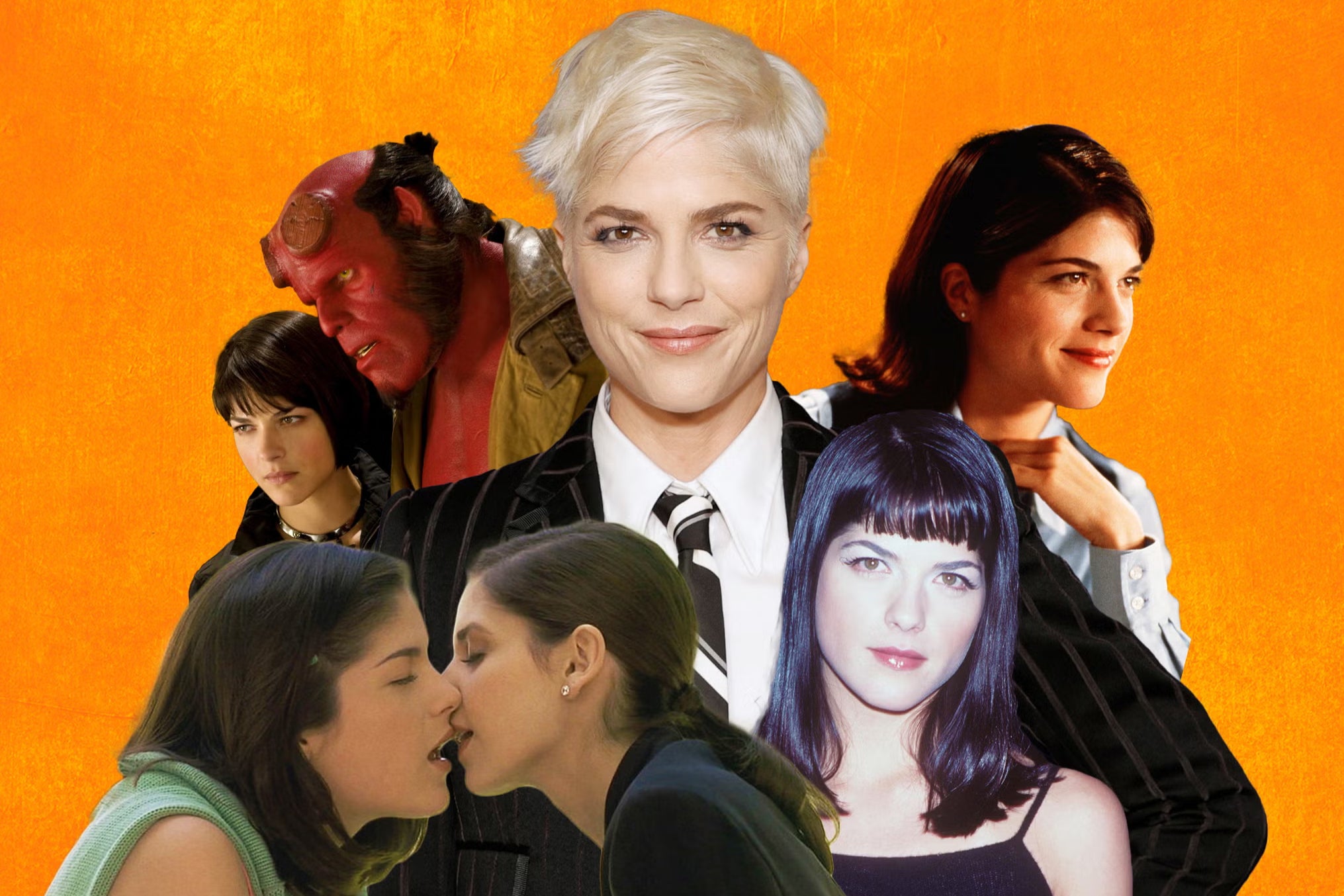Selma Blair’s revealing memoir Mean Baby captures the final days of Hollywood privacy
The ‘Cruel Intentions’ star has written an open-hearted account of her painful early years and celebrity relationships that gives us an unseen view of this underrated actor, says Adam White


After she shaved her head at the peak of her 2007 mental health crisis, Britney Spears took to wearing an assortment of multi-coloured wigs in public. Today, one of them lives in Selma Blair’s closet. How the star of Legally Blonde, Cruel Intentions and Hellboy came to possess that platinum bob is one of those strange Hollywood coincidences, reflecting an industry far smaller than it first appears, and linked by its routine eagerness to chew up its young and spit them into rehab clinics.
Blair and Spears met in one of those, the former seeking treatment for alcoholism and depression, the latter in the midst of Being Britney in the late Noughties. Blair suggested her new friend ditch the wig, and eventually it ended up in her possession. They only hung out for a few weeks, Spears’s phone number changing within days of her release. “She was so gamine and young, but in a horrible situation,” Blair writes in her open-hearted and empathetic new memoir Mean Baby. “I had no real idea of the extent of her suffering.”
In her mid-thirties at the time, Blair was nearly a decade older than Spears, but her suffering was similarly fraught. Unlike the paparazzi-hounded singer, though, she had largely kept it out of the public eye. Partly because she was never enormously famous, a cryptic character actor adding darker hues to baby-pink Y2K comedies. She was definitely capable of doing more – plenty of people saw her in Cruel Intentions as an elastic-limbed and preternaturally naive high schooler wrapped up in a game of sexual blackmail. She’s funny in it, daffy, and deeply strange. It was her hair colour, though, that seemed to influence the roles she played afterwards. Legally Blonde, The Sweetest Thing and A Guy Thing cast her as prim, brunette back-up to the blondes of the era: Reese Witherspoon, Cameron Diaz, Julia Stiles. They were the superstars, Hollywood seemed to be saying. Blair was reliable support. Hellboy remains her biggest role in a studio movie, but it’s also a very weird studio movie: her leading man is a superhuman devil-thing.
Throughout Mean Baby, Blair demonstrates a rare level of self-awareness for someone who’s been encased in the celebrity industrial complex for most of her adult life. “I never figured out how to play the sweet, stable, capable, pretty person,” she writes. “Eccentric, weird prudes were my bread and butter.” She so wanted to play the polished, radiant Joey Potter on the seminal teen series Dawson’s Creek, but got beaten at the last minute by the “so tall, so pretty” Katie Holmes. She marvels at how Witherspoon seems to glide effortlessly through film sets, parties and even exercise classes.
Witherspoon is also one of the few stars approved of by Blair’s mother, who regularly gushes over her beauty and grace. Blair, on the other hand, is endlessly victim to her mother’s critique. In 1999, when she excitedly shows off the cover of Seventeen magazine that she graces, her mother replies: “Oh, Selma – you look so unimportant.”
That kind of low-level undermining would mark much of Blair’s adolescence and her earliest years as an actor. She’d also experience years of pain: a boyfriend who dies, a series of sexual assaults while trying to find acting work after college, suicide attempts. One particularly horrible – and also completely bizarre – episode saw her late father’s girlfriend attempt to derail her blossoming career, sending letters to Hollywood big-wigs claiming that Blair was a violent heroin user who wanted to commit violence against Drew Barrymore. Blair describes her father’s girlfriend as a “struggling TV anchor”, and adds that she didn’t speak to her father for 12 years after the poison-pen scheme was exposed. Overall, Blair writes with unflinching, unapologetic honesty about her trauma. Her background may be moneyed – her mother worked as a judge – but it’s underpinned by inherited chaos, insecurity and self-loathing.

Most intriguing is how the book reflects a Hollywood in transition. Blair found fame in something of a hybrid era – a pre-internet climate of privacy and off-camera struggle sliding haphazardly into one dominated by predatory gossip sites like Perez Hilton and TMZ. Perhaps because of her relatively minor level of notoriety at the time, she seems to move through the industry like a ghost. She’s in a years-long relationship with Rushmore’s Jason Schwartzman that barely anyone knows about. She’s close friends with Carrie Fisher, but so privately that she doesn’t get an invite to her funeral. She was in rehab with Spears at a time when absolutely everyone was talking about Spears being in rehab, yet despite the round-the-clock surveillance by the paparazzi, no one appeared to notice Blair was there with her.
As a reader, you leave Mean Baby convinced that we knew nothing back then. And that the big teen entertainment boom of the late Nineties – the dawn of Britney, Buffy, Neve Campbell and Freddie Prinze Jr – wasn’t so much a golden age, more the last days of an empire. Blair was one of those dazzling twentysomething stars playing 16-year-olds, who looked fresh-faced and perfect. Immaculate “white teeth teens”, as Lorde once sang. But she and her peers were also complete mysteries, able to forge celebrity friendships and love affairs on the down-low, and despise themselves with not a soul knowing. It would be naive to say that doesn’t happen any more, that the stars of Euphoria being on Instagram means they’re absolutely, publicly transparent about their deepest feelings. But there is a difference. A bit more openness, or more freedom to be “real” in a way that didn’t exist for stars like Blair 20 years ago.
It leaves Mean Baby not only as a celebration of one of the most underrated stars of that era. It also fills in the gaps we didn’t even know were missing.
‘Mean Baby’ is in shops now via Virago
Join our commenting forum
Join thought-provoking conversations, follow other Independent readers and see their replies
Comments


Bookmark popover
Removed from bookmarks